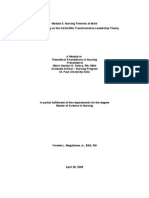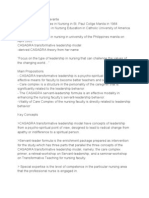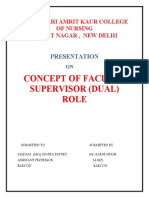M17 Agravante
M17 Agravante
Uploaded by
bince0622Copyright:
Available Formats
M17 Agravante
M17 Agravante
Uploaded by
bince0622Original Title
Copyright
Available Formats
Share this document
Did you find this document useful?
Is this content inappropriate?
Copyright:
Available Formats
M17 Agravante
M17 Agravante
Uploaded by
bince0622Copyright:
Available Formats
TFN (M17 AGRAVANTE )
SISTER CAROLINA S. AGRAVANTE’S CASAGRA TRANSFORMATIVE LEADERSHIP
MODEL
“Focus on the type of leadership in nursing that can challenge the values of the changing
world…”
Life Story:
✔ Bachelor’s Degree in Nursing in St. Paul College Manila in 1964
✔ Master’s Degree in Nursing Education in Catholic University of America in 1970
✔ Doctoral degree in nursing in university of the Philippines manila on April 2002
✔ derived CASAGRA theory from her name
Theory Description:
✔ The complete title of her model is ”The CASAGRA Transformative Leadership
Model: Servant – Leader Formula & the Nursing Faculty’s Transformative Leadership
Behavior”.
✔ The theory <CASAGRA Transformative Leadership= is a psycho spiritual model.
✔ This is classified as a Practice Theory basing on the characteristics of a Practice
Theory stated by McEwen (2007):
▪Complexity / Abstractness, Scope - Focuses on a narrow view of reality, simple and
straightforward
▪ Generalizability / Specificity - Linked to a special populations or an identified field of
practice
▪ Characteristic of Scope – Single, concrete concept that is operationalized
▪ Characteristic of Proposition – Propositions defined
▪ Testability – Goals or outcomes defined and testable
▪ Source of Development – Derived from practice or deduced from middle range theory
or grand theory
Theory Development:
- Nursing educators must focus on training nurses to meet the technological, educational, and
social demands in the Philippines today.
- With foreign markets reopening to Filipino nurses, competitive salaries and benefits are
drawing many abroad.
- Globalization requires nursing education to prepare nurses for international practice,
emphasizing global care and compassion.
- There is a pressing need for visionary nursing leaders with new skills to serve society
effectively.
- Nurses require skilled, caring leaders who are committed to the profession and assertive in
advocating for their rights.
Main Propositions of Theory:
✔ CASAGRA transformative leadership is a psycho-spiritual model, and is an
effective means for faculty to become better teachers and servant-leaders.
✔ Care complex is a structure in the personality of the caregiver that is
significantly related to leadership behavior.
✔ The CASAGRA servant-leadership formula is an effective modality in
enhancing the nursing faculty’s servant-leadership behavior.
✔ Vitality of Care Complex of the nursing faculty is directly related to
leadership behavior
NOTES NI BINS DI MANG HATAG
TFN (M17 AGRAVANTE )
Major Concepts & Definitions: The CASAGRA Transformative Leadership Model has concepts
of leadership from a psycho-spiritual point of view, designed to lead to radical change from
apathy or indifference to a spiritual person.
Servant-leader formula: An intervention package with three parts—care complex primer, a
servant-leadership retreat-workshop, and a transformative teaching seminar for nursing faculty.
Special expertise: Competence in a specific nursing area, practiced in a reflective, prayer-
focused workshop centered on Jesus as a Servant-leader.
Servant-leadership behavior: Nursing faculty’s demonstration of servant-leadership qualities,
including role modeling, fostering student growth, nursing skill competency, professional
commitment, and community collaboration.
Nursing leadership: The guiding force in nursing that defines vision, roles, and professional
direction.
Transformative teaching: Also known as reflective teaching, encompassing thoughtful
instruction, research, narrative, and teacher empowerment.
Care complex: The core of a nurse's care identity, shaped by maternal care, cultural practices,
and formal nursing education.
NOTES NI BINS DI MANG HATAG
TFN (M17 AGRAVANTE )
The conceptual framework is logical because the variables are very well explained on how
transformative-leadership models are applicable through complex, transformative teaching
servant-leader spirituality, and servant-leader behavior.
Application to Nursing:
● Nursing Practice: Charge nurses play a key leadership role, guiding shifts with care
and compassion, similar to a “captain of the ship.” The servant-leader formula helps
them lead and educate others, especially newer nurses, while embodying selfless
service inspired by Jesus’ teachings. This approach fosters a vibrant "care complex,"
motivating other nurses to lead with a spirit of service.
● Nursing Education: Nurse educators can implement servant-leadership by passionately
sharing their expertise and engaging in selfless knowledge-sharing. They stay updated
through workshops, applying evidence-based practices via simulations, which they then
incorporate into student learning.
● Nursing Administration: This model supports organizational goals by developing a
network of skilled, innovative educators dedicated to excellence and nation-building. Its
spiritual basis, inspired by Jesus’ teachings, fosters ethical practice. However, its Bible-
based foundation may face resistance in diverse cultural or religious contexts, such as in
Muslim-majority countries.
● Nursing Research: Though specific research citations are lacking, the model can be
adapted to embrace diverse religious backgrounds by including nursing educators from
various institutions. Given global nursing demands, cultivating future leaders who uphold
and advance nursing quality is timely and essential.
Strength:
✔ It provided the task of the formation of the nurse leaders at the baccalaureate
level so that the profession assured the graduates possess the mind and heart of a
nursing leader who is of the nursing profession.
✔ It can also be used in other educational settings, not just in the nursing
profession.
Weaknesses:
✔ CASAGRA transformative leadership limits only on Roman Catholic and Christians
nursing educators; it did not consider other religions to this study. In the Philippines
we have a variety of religions present. Every religion has its own traditions and
practices to be considered.
✔ According to the study, the control and study groups were selected from the
same faculty in the two schools, it is highly possible that experience could have
been discussed casually in the faculty room and in some way must have
contaminated the intervention.
NOTES NI BINS DI MANG HATAG
TFN (M17 AGRAVANTE )
Conclusion:
▪ Indeed, Sr. Carolina’s CASAGRA Transformative Leadership Theory is timely in this ever fast-
paced world.
▪ Nursing as a profession is inevitably changing and the demand to be at par with technology
made it more competitive. Nursing students need nursing teachers to look up to.
▪ Embodied with the three-fold transformative leadership concepts, it is timely to put this theory
into practice.
NOTES NI BINS DI MANG HATAG
You might also like
- Local TheoriesDocument21 pagesLocal TheoriesNelvie Alcober100% (1)
- CASAGRADocument16 pagesCASAGRApatricia perez100% (1)
- Group 1 Agravantes Casagra Transformative Leadership ModelDocument23 pagesGroup 1 Agravantes Casagra Transformative Leadership ModelAlisa Fujibayashi67% (3)
- CArolina S. AGRAvanteDocument37 pagesCArolina S. AGRAvanteEllain Caballero100% (1)
- The CASAGRA Transformative Leadership ModelDocument7 pagesThe CASAGRA Transformative Leadership ModelLuci Ffer100% (1)
- Casagra TheoryDocument6 pagesCasagra TheoryArlie Marmolejo100% (4)
- Carolina Agravante TheoryDocument5 pagesCarolina Agravante Theorycarendleon100% (28)
- Carolina S. Agravante The Transformative Leadership TheoryDocument14 pagesCarolina S. Agravante The Transformative Leadership TheorymegNo ratings yet
- Carolina AgravanteDocument14 pagesCarolina AgravanteLeann LeongNo ratings yet
- CasagraDocument9 pagesCasagraRonnie De Vera UnoNo ratings yet
- Nursing ThoeristDocument9 pagesNursing ThoeristLanie SoriaNo ratings yet
- The Transformative Leadership TheoryDocument6 pagesThe Transformative Leadership TheoryYvi AshenaNo ratings yet
- Agravantes CASAGRA Transformative Leadership ModelDocument23 pagesAgravantes CASAGRA Transformative Leadership ModelPauline An Toni CapurihanNo ratings yet
- Casagra Tranformative Leadership TheoryDocument24 pagesCasagra Tranformative Leadership Theorypadilla.jowinkingNo ratings yet
- CASAGRA BSN1-A GROUP 2 End-Term ReportDocument19 pagesCASAGRA BSN1-A GROUP 2 End-Term ReportMADAYAG, RUTH L.No ratings yet
- Local Conceptual ModelsDocument10 pagesLocal Conceptual ModelsCharmaine Vergara - Gementiza100% (2)
- NCM 100 Finals Copy 2Document12 pagesNCM 100 Finals Copy 2Villacorte, Christine Mae B.No ratings yet
- The Transformative Leadership TheoryDocument10 pagesThe Transformative Leadership TheoryxoxoNo ratings yet
- CASAGRADocument2 pagesCASAGRAloydaNo ratings yet
- AgravanteDocument18 pagesAgravantekrishaeleazarpangilinanNo ratings yet
- NCM 100 Final Lecture 2023 2024Document30 pagesNCM 100 Final Lecture 2023 2024makisazchNo ratings yet
- Dr. Carolina S. Agravante: The CASAGRA Transformative Leadership ModelDocument21 pagesDr. Carolina S. Agravante: The CASAGRA Transformative Leadership ModelCotales, Floramae T.No ratings yet
- Chapter 7TFNDocument14 pagesChapter 7TFNZadiah Gonatise IsaguirreNo ratings yet
- Theoretical 3Document11 pagesTheoretical 3Shane OseñaNo ratings yet
- Filipino Nursing TheoristDocument82 pagesFilipino Nursing TheoristGraciela MacasaddugNo ratings yet
- NCM 100 Final Lecture 2023 2024Document21 pagesNCM 100 Final Lecture 2023 2024ZcarinaDeborah ManagoNo ratings yet
- Casagra Transformative Leadership ModelDocument2 pagesCasagra Transformative Leadership ModelMark S.No ratings yet
- CASAGRA Transformative Leadership ModelDocument7 pagesCASAGRA Transformative Leadership ModelTrizza VelosoNo ratings yet
- The CASAGRA Transformative Leadership ModelDocument1 pageThe CASAGRA Transformative Leadership ModelAshley PapaNo ratings yet
- CASAGRA Transformative Leadership Model by Sr. Carol Agravante & Composure Behavior and Patient's Wellness Outcome Model by Carmelita DivingraciaDocument2 pagesCASAGRA Transformative Leadership Model by Sr. Carol Agravante & Composure Behavior and Patient's Wellness Outcome Model by Carmelita DivingraciaJhunmae KindipanNo ratings yet
- SDL TheoristsDocument6 pagesSDL TheoristshannahkristelraymundoNo ratings yet
- SupervisorDocument16 pagesSupervisorshijoantonyNo ratings yet
- Research in Continuing EducationDocument5 pagesResearch in Continuing EducationTahir SiddiquiNo ratings yet
- Research in Continuing Education Seminar Typed ContentDocument17 pagesResearch in Continuing Education Seminar Typed Contentjasmine9046No ratings yet
- Concept of Faculty SupervisorDocument14 pagesConcept of Faculty SupervisorThilaga Ram0% (1)
- Seminar On Concept of Faculty Supervisor Position in Nursing (Dual Role)Document8 pagesSeminar On Concept of Faculty Supervisor Position in Nursing (Dual Role)baby100% (1)
- Research in Continuing Education Seminar Typed ContentDocument17 pagesResearch in Continuing Education Seminar Typed ContentIze C Viji94% (16)
- CONCEPT OF FACULTY SUPERVISOR POSITION IN NURSING - WordDocument8 pagesCONCEPT OF FACULTY SUPERVISOR POSITION IN NURSING - WordSMITHA JOSENo ratings yet
- Concept of Faculty Supervisor (Dual) Role: Rajkumari Amrit Kaur College of Nursing Lajpat Nagar, New DelhiDocument8 pagesConcept of Faculty Supervisor (Dual) Role: Rajkumari Amrit Kaur College of Nursing Lajpat Nagar, New DelhiMallika JoonNo ratings yet
- An Assignment On: Concept of Faculty Supervisor (Dual Role) PositionDocument13 pagesAn Assignment On: Concept of Faculty Supervisor (Dual Role) Positionsoniya josephNo ratings yet
- Concept of Faculty Supervisior in Dual PositionDocument18 pagesConcept of Faculty Supervisior in Dual PositionDeepa86% (7)
- A. Week1 The Nursing ProfessionDocument92 pagesA. Week1 The Nursing Professionjppitogo6948antNo ratings yet
- Faculty SupervisorDocument15 pagesFaculty SupervisorRaja67% (3)
- Seminar On Dual Role of NurseDocument16 pagesSeminar On Dual Role of Nursedanimon198475% (4)
- Dual Position of Nursing...Document12 pagesDual Position of Nursing...sahuajaykumar554No ratings yet
- NCM - Finals (5-6) PrintDocument10 pagesNCM - Finals (5-6) PrintAaron Gerard LugtuNo ratings yet
- Local Conceptual Nursing Models ONLINEDocument20 pagesLocal Conceptual Nursing Models ONLINERia Shan Inochi RelamidaNo ratings yet
- Week 15Document3 pagesWeek 15Juan Miguel TevesNo ratings yet
- Local Nursing Theories Group 6Document43 pagesLocal Nursing Theories Group 6ambhit MoNo ratings yet
- Guidance and Couselling SeminarDocument19 pagesGuidance and Couselling Seminarshipa shaikh100% (1)
- Literature Review On Mentoring in NursingDocument7 pagesLiterature Review On Mentoring in Nursingafmznqfsclmgbe100% (1)
- Chloe - Paper 1Document7 pagesChloe - Paper 1api-458494853No ratings yet
- Nurse Educator Practicum - Reflective Journal 7Document3 pagesNurse Educator Practicum - Reflective Journal 7api-643881078No ratings yet
- No.4 Continuing-Education-In-NursingDocument15 pagesNo.4 Continuing-Education-In-NursingPawan BatthNo ratings yet
- Casagra Transformative Leadership Model: (Sister Carolina Agravante)Document21 pagesCasagra Transformative Leadership Model: (Sister Carolina Agravante)Erica Velasco100% (1)
- NURS3514 Leadership YORK Article NotesDocument59 pagesNURS3514 Leadership YORK Article Noteselizabeth.morozov03No ratings yet
- Nurse As An EducatorDocument10 pagesNurse As An EducatorErl D. Melitante100% (1)
- Navigating School Improvement: The Essential Guide to Effective School LeadershipFrom EverandNavigating School Improvement: The Essential Guide to Effective School LeadershipNo ratings yet
- A Guide to Medical Teaching and Learning Training of the Trainers (Tot): In the View of the Learner-Centered Learning ModelFrom EverandA Guide to Medical Teaching and Learning Training of the Trainers (Tot): In the View of the Learner-Centered Learning ModelNo ratings yet
- Principles for Princi-PALS and Teachers!: One Principal’s Mind-Staggering Insight into Students’ Hope-Filled FuturesFrom EverandPrinciples for Princi-PALS and Teachers!: One Principal’s Mind-Staggering Insight into Students’ Hope-Filled FuturesNo ratings yet
- Twenty-One Nursing Problems: Theoretical Foundation of NursingDocument2 pagesTwenty-One Nursing Problems: Theoretical Foundation of Nursingbince0622No ratings yet
- Theoretical Foundation of NursingDocument2 pagesTheoretical Foundation of Nursingbince0622No ratings yet
- Respiratory SystemDocument4 pagesRespiratory Systembince0622No ratings yet
- m12 HendersonDocument4 pagesm12 Hendersonbince0622No ratings yet
- M16 ParseDocument5 pagesM16 Parsebince0622No ratings yet
- M17 LocsinDocument3 pagesM17 Locsinbince0622No ratings yet
- M18 KuanDocument2 pagesM18 Kuanbince0622No ratings yet
- M18 DivinagraciaDocument2 pagesM18 Divinagraciabince0622No ratings yet
- 0455 s17 Ms 12Document3 pages0455 s17 Ms 12Seong Hun LeeNo ratings yet
- Lcci Withdrawal FaqsDocument3 pagesLcci Withdrawal FaqsVincsNo ratings yet
- Wuolah-Free-Examenes - Use of English (Part 4) PDFDocument186 pagesWuolah-Free-Examenes - Use of English (Part 4) PDFPedro RodríguezNo ratings yet
- 9702/01 Paper 1 (Multiple Choice), Maximum Raw Mark 40Document4 pages9702/01 Paper 1 (Multiple Choice), Maximum Raw Mark 40yasser.anisNo ratings yet
- Int Gcse Summer 2024 FinalDocument26 pagesInt Gcse Summer 2024 FinalabdulbashirshahriarNo ratings yet
- ''Caravan's-General-Knowledge-MCQs Best PDF Book Download FreeDocument6 pages''Caravan's-General-Knowledge-MCQs Best PDF Book Download FreeMehran jabbarNo ratings yet
- Babul PDFDocument1 pageBabul PDFSäñtôsh Kûmãr PrâdhäñNo ratings yet
- Academic Cum Examination Calendar 2024-25Document7 pagesAcademic Cum Examination Calendar 2024-25pineb14317No ratings yet
- Admission GuidebookDocument246 pagesAdmission GuidebookjayonetzNo ratings yet
- ST - Peter's Thesis FormatDocument6 pagesST - Peter's Thesis FormatPrateek BhandariNo ratings yet
- 6212316 (1)Document7 pages6212316 (1)RamyaNo ratings yet
- Medical Council of India-2018-19 PDFDocument6 pagesMedical Council of India-2018-19 PDFAnkit RakeshNo ratings yet
- Ritika Front Pages ExternalDocument7 pagesRitika Front Pages ExternalJoy CharlesNo ratings yet
- Part 26Document27 pagesPart 26hbksloveNo ratings yet
- M Phil Timetable Feb 2019 RevisedDocument4 pagesM Phil Timetable Feb 2019 RevisedThiyaNo ratings yet
- Dissertation. FORMAT PNDocument5 pagesDissertation. FORMAT PNVeekeshGuptaNo ratings yet
- Cds 1 2022 Final Merit ListDocument6 pagesCds 1 2022 Final Merit ListRajat ChaudharyNo ratings yet
- MIT 2011 2012 Admission FormDocument2 pagesMIT 2011 2012 Admission FormcutekNo ratings yet
- Maths Comparison Summary ReportDocument274 pagesMaths Comparison Summary ReportShahrukh MunirNo ratings yet
- Sia - Upsc - Mock Test 1-Paper II-csat-resultsDocument232 pagesSia - Upsc - Mock Test 1-Paper II-csat-resultsJaisonArockiaNo ratings yet
- Polangui Campus: Bicol UniversityDocument4 pagesPolangui Campus: Bicol UniversityPaulo Pacardo RellonNo ratings yet
- Thông Tin Du Học - StudentsDocument67 pagesThông Tin Du Học - StudentsTun DoNo ratings yet
- Editorial Board - 2018 - Journal of Surgical ResearchDocument2 pagesEditorial Board - 2018 - Journal of Surgical ResearchPatrick PolitoNo ratings yet
- Madras University Chennai Centre May2009Document2 pagesMadras University Chennai Centre May2009goodygood1No ratings yet
- SHIVAJI UNIVERSITY, KOLHAPUR - Date of Result 010612Document18 pagesSHIVAJI UNIVERSITY, KOLHAPUR - Date of Result 010612sdsspiritNo ratings yet
- FCS 20210528 Not WebpageDocument19 pagesFCS 20210528 Not WebpageHemnath Patra দর্শনNo ratings yet
- Final Merit List For Recruitment of Data Entry Opearator Under DR Ysr Health Clinics On Out Sourcing Basis in Guntur DistrictDocument60 pagesFinal Merit List For Recruitment of Data Entry Opearator Under DR Ysr Health Clinics On Out Sourcing Basis in Guntur DistrictLalith KondamudiNo ratings yet
- University of New Brunswick New Brunswick, Canada Master of Engineering RequirementsDocument3 pagesUniversity of New Brunswick New Brunswick, Canada Master of Engineering RequirementsSorrawit TantipalakulNo ratings yet
- GMAT Study GuideDocument23 pagesGMAT Study GuideEli100% (1)
- Andhra Pradesh Board of Intermediate Second 2nd Year Results 2019 From Manabadi - Com HarshaDocument1 pageAndhra Pradesh Board of Intermediate Second 2nd Year Results 2019 From Manabadi - Com HarshaHarsha GoriparthiNo ratings yet

































































































